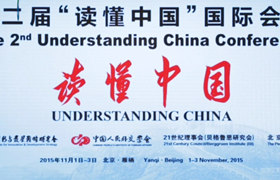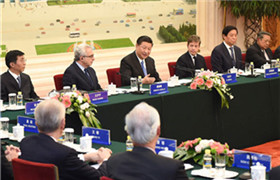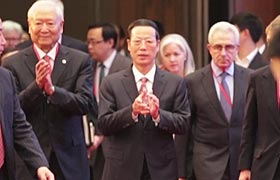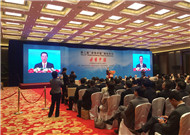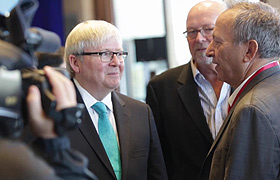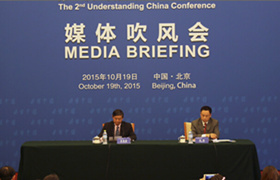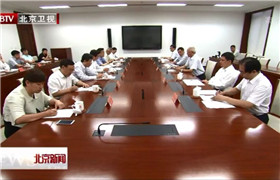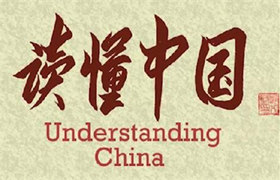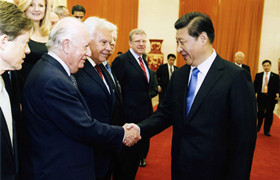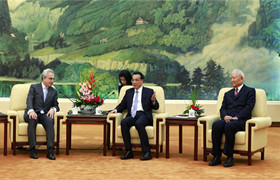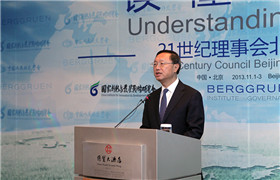- HOME--> News
-
Yang Jiechi and Zheng Bijian attend the "Understanding China" Conference, each delivering a keynote speech
2015-11-02 Source:China.com.cn Author:Yang Gongzhen
China.com.cn (by correspondent Yang Gongzhen) China's State Councilor Yang Jiechi delivered a keynote speech titled Building New International Relations to Create a Bright Future for the World at 2nd "Understanding China" International Conference on the morning of November 2. According to Yang, during the attendance at the UN summit series, President Xi Jinping proposed that the international community should establish new international relations on the basis of win-win cooperation, and put forward an idea of creating a community of common human destiny through a five-in-one approach. His thinking is rooted in the profound Chinese civilization and aligned to the trend of the times, and will have considerable implications on the evolution of relations between countries. In the new context, China is willing to work with other countries to create a global network of partnerships, drive the sustainable co-development of all countries, facilitate democratization and the rule of law in international relations, and jointly cope with hot issues and global challenges, thus opening a new chapter in relations between China and the world.
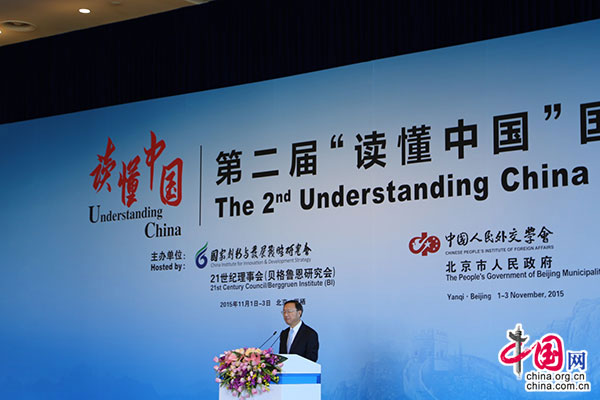
China's State Councilor Yang Jiechi delivers a speech at the 2nd “Understanding China” International Conference (Photo by Yang Gongzhen)
CIIDS Chairman Zheng Bijian delivered a keynote speech "Catch up with the Times" and the Communist Party of China of China. The title is derived from Deng Xiaoping's famous quote: "We must catch up with the times, and that is what reform aims at." Zheng Bijian stated that a thorough understanding of the CPC is necessary to understand China's strategy for the coming five years. The essential nature of socialism with Chinese characteristics is the CPC's leadership.
According to Zheng, Since its founding in 1921, the CPC has experienced two fundamental tests and given two fundamental fight-backs in nearly a century. The first was turning the war into the big opportunity for "the Chinese people to stand up." The second began in the late 1970s, with the big challenge of "peace and development" in the era translated into a great chance for China's great development. The macro proposition running through the two tests is "catching up with the times," which is the only way to "save" and "develop" China.
Zheng stated that the 13th Five-year Plan adopted at the Fifth Plenary Session of the 18th CPC Central Committee put forward a philosophy of innovative, coordinated, green, open and shared development, reflecting the CPC’s pursuit of value to uphold the people’s principal position and "catch up with the times." Also, it shows that the CPC is not an egotist merely seeking a quick fix.
He also states that since the convening of 18th CPC National Congress, the country has ushered in a new phase of governance, with the Party discipline strengthened and the exercise of power subject to institutional confinement, so that the CPC is now better positioned to "catch up with the times". It is noteworthy that in the fight against corruption the CPC is bold to scrape the poison off the bone while adhering to the correct direction with strategic perseverance. The century-long trials and efforts prove CPC’s uniqueness in the history of political parties.
Zheng reiterates that several general principles will not and cannot be changed, namely the fundamental purpose of serving the people, the ideology of emancipating the mind and seeking truth from facts, and the basic route of building socialism with Chinese characteristics. Meanwhile, a series of concepts, guidelines and governance systems will "catch up with the times" through necessary "changes" on an ongoing basis. Ultimately, the true meaning of "catching up with the times" lies on sticking to China’s own path towards the forefront of the era via constant reform, innovation and development to realize the Chinese dream: rejuvenating the Chinese nation.
Zheng concludes that the successful experience in the past 30 years of reform and opening up should be treasured, and the difficulty in the decisive stage of completing the building of a moderately prosperous society shall not be underestimated despite of its promising prospect. The CPC together with all the Chinese people will be even more diligent, sober and humble. We expect the international community to understand and respect Chinese people's struggle and target, and to “understand China” from such a perspective.
The speech was highly recognized amongst the domestic and foreign distinguished guests. Nathan said that interpreting the CPC by way of its "catching up with the times" was not a conventional perspective, "the speech is so profound that I need to study it carefully".
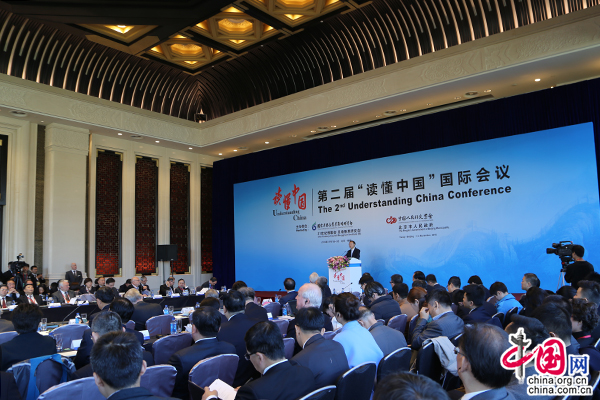
Scene venue of the 2nd “Understanding China” International Conference (Photo by Yang Gongzhen)
Former Australian Prime Minister Kevin Rudd made a keynote speech titled "China in the Eyes of the World." In his speech, he stated that China had become a major power, whose peace and stability was of global significance; China's future sustainable development was also crucial for global prosperity. He remained optimistic about China's future.
Mr. Rudd admits that in economic terms, the world gives overwhelmingly positive feedback to China, all amazed at the country’s spectacular economic reform during the past 35 years. China has pulled 600 million people out of poverty, while the 200 million below the WB’s poverty line can live above the subsistence level. As far as its economic growth is concerned, China contributed over 40% to the global economic growth in 2015. Without China's growth, the global economy would have been particularly fragile.
He pointed out that the West tended to underestimate the tolerance and sustainability of an economy, and believed that most of the current analyses made by Western commentators on China's stock market were not objective, and so was the analysis of the recent devaluation of the Renminbi currency by 3%.
He admitted that in the domain of international political economy, people showed deep respect for the completeness of China’s infrastructure nationwide.
Finally, Mr. Rudd talked about China’s latest intention to send more peacekeepers to the UN, as well as its positive reaction to the UNFCCC, its efforts to promote sustainable development objectives, and its kick-off of the world's first officially developed assistance program, all being positive signs released to the future.
At the end of the speech, Mr. Rudd quoted a famous line in the Chinese opera "Yang Silang Visits His Mother" to express his feelings: "I’m like a goose losing its flock when heading north." Australian as he is, he believes that we can come together when looking at the different cultures of the East and West.
The Conference was co-sponsored by CIIDS, CPIFA, Beijing Municipal People's Government and 21st Century Council. Over 40 former dignitaries, strategists and business leaders from around the world were present at the Conference.
-
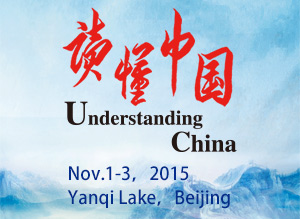
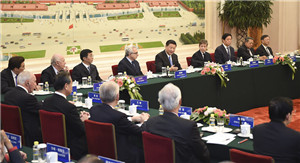
The 2nd "Understanding China" ConferenceOn November 1~3, 2015, the 2nd “Understanding China” Conference was held in Beijing Yanqi Lake International Conference Center. Zhang Gaoli, Vice Premier of the State Council, attended the opening ceremony.
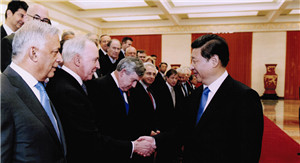
The 1st "Understanding China" ConferenceOn November 1~3, 2013, the 1st “Understanding China” Conference was held in Beijing, which was cosponsored by China Institute for Innovation & Development Strategy (CIIDS), Chinese People’s Institute of Foreign Affairs (CPIFA), and Berggruen Institute on Governance.
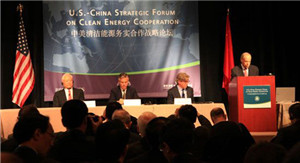
The 2nd U.S.-China Strategic Forum on Clean Energy CooperationWith the “Prospects for U.S.-China strategic cooperation in next decade” as its theme, the forum dwells on the implications of U.S.-China cooperation from the strategic perspective of coping with global challenges and maintaining world peace.
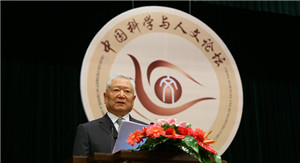
The China Sciences and Humanities ForumCo-initiated in April 2003 by renowned Chinese scientist Mr. Lu Yongxiang and influential political strategist Zhen Bijian, China Sciences and Humanities Forum was jointly hosted by Graduate University of Chinese Academy of Sciences (GUCAS) and the Higher Education Press.

